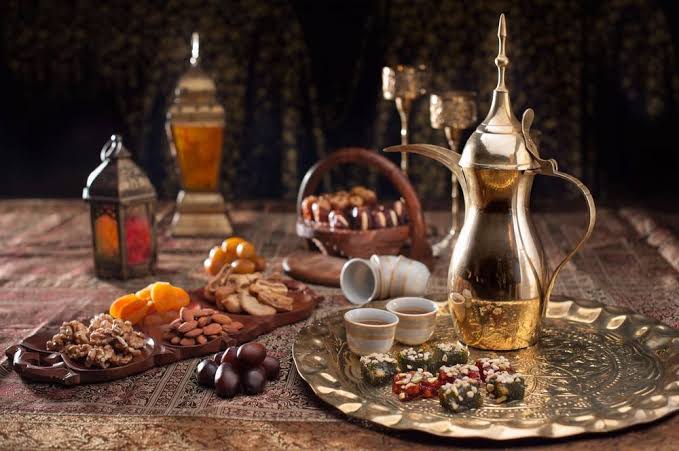The hospitality customs and traditions that Saudis have upheld for a very long time until they proved themselves deserving of them are widely recognised.
Is there anyone who hasn’t seen or heard of the dates, coffee, sweets, and mansaf that are served to guests when they visit the Kingdom of Saudi Arabia?
Understanding Hospitality Customs Scientifically
The Arabian Peninsula’s hospitality norms, particularly in Saudi Arabia, have piqued the curiosity of Western experts. They hope to learn more about these customs and provide scientific explanations based on anthropology and human science, without inflating their sentimental attachment to this desert.
The Arabs sought to strike a balance between preserving their generosity and practising austerity due to their extreme poverty and lack of resources in the arid desert. The message was that the impoverished had to treat others with respect while they were hosting guests, just as the wealthy.
Consequently, experts developed what they refer to as hospitality norms to ensure this equation. They also connected these protocols to moral principles, so it is disgraceful if the host does not follow them.
Initially, it is impolite to fill the cup to the brim with coffee; instead, you should fill it to around 20% so that the underprivileged won’t feel guilty about filling the tiny cup. Along with it, the guest receives many coffee cups, each of which has a name.
The term “guest’s cup” refers to the first cup or the “cup of hospitality,” and it is improper for the visitor to refuse its consumption. The second cup is the cup of pleasure, since he enjoys sipping it, should he choose to do so. The third cup, the sword cup, is akin to engaging in combat with the guests he is entertaining or battling alongside them against their adversaries.
Arab Hospitality Practices
The tribe’s sheikh or elder must entertain a stranger who visits them to avoid burdening the impoverished with more hospitality than they can bear. It is also dishonourable for the sheikh of the tribe to refuse to welcome his visitors.
A full lamb or meat was not customarily served since, not so long ago, the Arabs—including the Saudis—would provide rice and broth to the guests. If he was not content, he would tell them to “give us what you have,” at which point they would serve him meat. One expression that has a tendency frequently to excuse any lack of consideration for the visitor is “Generosity from what is available.”
Some tribes in Saudi Arabia have a tradition of turning out the lights while dining so that the visitor feels comfortable and the host doesn’t feel guilty about his impotence. The adage “After the aloe wood, there is no sitting” refers to this need among some tribes, according to anthropologists and psychologists, who state that providing incense and aloe wood after meals signifies the end of hospitality.
In the Kingdom of Saudi Arabia, people always welcome visitors, and social gatherings around the table are a fundamental part of the Saudi family’s culture.
Additionally, it is customary in all Saudi areas for the host to refrain from starting to eat the feast before the visitor and to avoid making the guest feel uncomfortable by not looking at them while they are eating. The host eats slowly and waits to indicate that he is done until after the visitor has finished since he is not permitted to leave the table before his guest. When hosting, these are all basic practices that make the visitor feel at ease.
Timeless Essence of Arab Hospitality
Modern-day Arabs have a good reputation for their generosity and hospitality, valuing food and drink as integral parts of their culture. Coffee is the most popular beverage, with Arabs taking pride in the innovative methods and tools used to prepare it. The Arab world has an immense tradition of hospitality.
Currently, Saudi Arabia is bringing the old and contemporary together and innovating in the hospitality customs industry. Nowadays, dates—one of the fundamentals of hospitality—appear elegantly and incorporate various forms and creative wrapping. It is customary in Saudi culture to provide gifts to visitors, and it is ideal if the gift fits the recipient and the occasion while adhering to Islamic customs.
Even if coffee pots have changed to thermoses that keep drinks warm for extended periods and hospitality has improved, certain Bedouin tribes continue to practice their original, age-old practices and traditions. As evidence of their generosity and goodwill, several Bedouin tribes in the Kingdom of Saudi Arabia drizzle freshly made country butter over their guests’ food as soon as they begin to consume it.
Some tribes offer a lamb feast to guests, but only if they don’t eat its eye or remove it. Exceeding this is a dishonour to the cuisine, and the host must butcher another lamb. Occasionally, the host asks the visitor to pardon them for their actions.
The ideal way to serve premium dates is to offer them separately and with coffee. Nut fillings frequently take the place of the pits. Accepting the hospitality shown to you is a sign that you welcome friendship. After coffee, sweets or ginger tea are provided. The visitor takes a seat at the head of the table, adjacent to the family head.
Moral Views of Saudi Heritage
Typically, the most esteemed visitor takes a seat at the head of the table. It is ideal to wait for the oldest person to start eating. Usually, once he says “Bismillah,” everyone starts.
In the Kingdom of Saudi Arabia, being hospitable has gone beyond providing food and beverages; it also includes planning free excursions and giving citizens tours of their home cities. Given the rapid growth of cities and the availability of leisure options, showing visitors about the city has evolved into a symbol of hospitality customs.
According to Dr. Saad Al-Suwaian, a professor of sociology, living in this arid desert since the beginning of time is both an accomplishment in and of itself and a life full of values and ideals. In this environment, the Arabic language and aesthetics found new frontiers, and Arabs have long admired the wolf because it symbolises the height of success when it comes to adapting to the desert environment.
Anthropology encompasses a profound and accurate interpretation of Arab and Saudi customs and traditions, in addition to a philosophical and moral interpretation that inspires Saudi pride in their ancestors’ rich past and their honourable traditions.